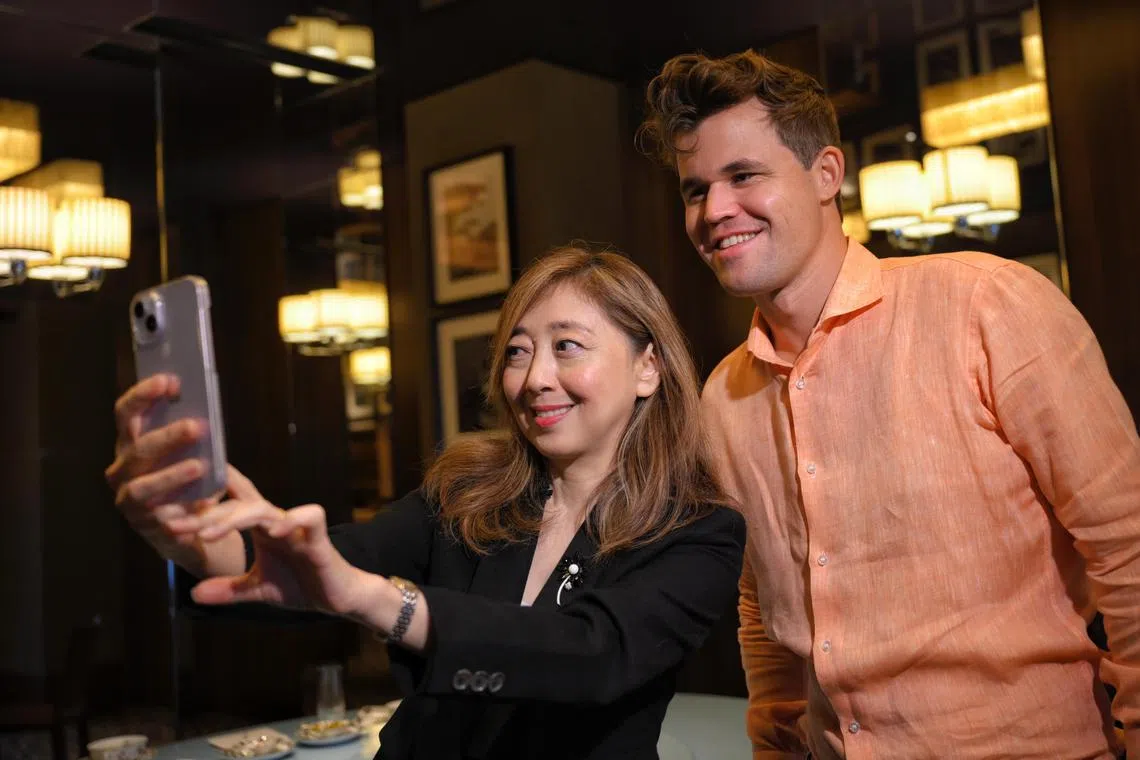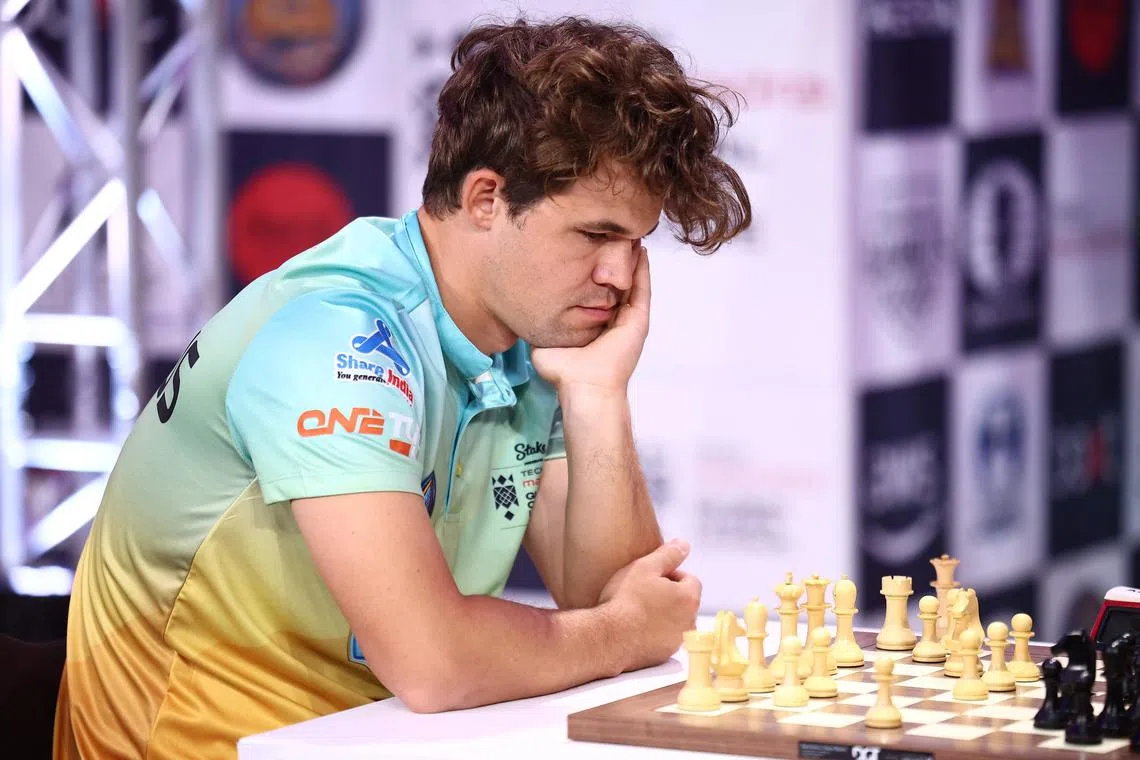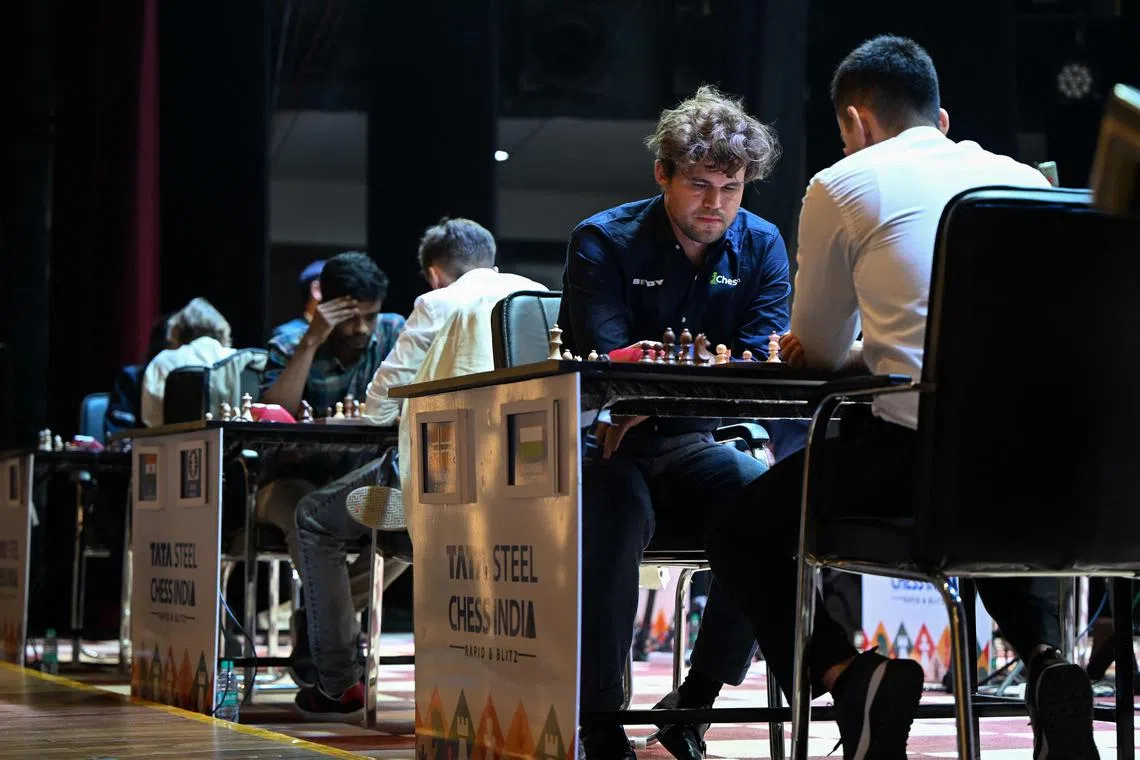Lunch with Sumiko
Chess is a really harsh game; when you lose, your ego is deflated, says world No. 1 Magnus Carlsen
The Norwegian grandmaster tells executive editor Sumiko Tan how it’s hard for top players to be good friends with rivals chasing the same victories.
Sign up now: Get the biggest sports news in your inbox
While chess champion Magnus Carlsen has moved away from the traditional game in favour of freestyle chess, he is still fiercely competitive. He tells Sumiko Tan: "I want to beat everybody. If they get me once, I want to hit them back several times."
Follow topic:
The hot and sour soup does it.
It perks Magnus Carlsen up and puts him in a much better mood.
The Hong Kong noodles are another brightener, as is the small bowl of honey-coated almonds, which he polishes.
By the time our lunch at Summer Pavilion has ended, the world’s No. 1 chess player is positively cheerful.
“You want serious or smiling?” he helpfully asks the photographer who is setting him up for a portrait.
Smiling is good, says the photographer, prompting a response from the Norwegian grandmaster.
“Can one of you say something funny? Any Singaporean jokes?”
We look at each other, stumped. Not a single joke comes to mind.
“Like, who would you make jokes about here?” Carlsen cajoles. “Malaysians? Indonesians? Because Norwegians, we make jokes about Swedes and Danes,” he laughs.

Norwegian chess grandmaster Magnus Carlsen has won the World Chess Championship five times.
ST PHOTO: MARK CHEONG
I rack my brain but cannot think of anything and steer him to other topics instead.
Is pink your favourite colour, I ask, gesturing at his crisp linen shirt.
Nah, he says, it is probably his only shirt in this colour.
You must be used to the camera as you have modelled before, I venture. The grandmaster, who is about 1.78m tall, was once famously the face of Dutch fashion brand G-Star RAW.
“Long time ago,” he laughs. “Different life.”
Carlsen’s easy demeanour is a far cry from when he arrived an hour earlier for the interview on Nov 24.
I had arranged the lunch through his girlfriend, Ms Ella Malone, who sees him off with a kiss at the entrance of Summer Pavilion, a Cantonese restaurant at The Ritz-Carlton Millenia Singapore where they are staying.
She heads off for lunch with friends. He follows me to our private dining room looking like someone being dragged to the dentist.
Ms Malone had told me that 45 minutes would be about right for the interview. When I check with Carlsen, he says, decisively: “Let’s try to do half an hour.”
I suppose facing a reporter and camera crew on a Sunday afternoon cannot be high on anyone’s list of favourite things to do. But such is the burden of being the most famous player on the chess circuit.
For the first 10 minutes, the 34-year-old grandmaster is polite but fidgets and looks resigned to his fate.
“This is my only commitment today,” he says when I inquire about his day’s programme. “Otherwise I will try to, you know, be a tourist a little bit.”

ST executive editor Sumiko Tan and Magnus Carlsen at Summer Pavilion on Nov 24.
ST PHOTO: MARK CHEONG
I had sent Ms Malone the menu earlier and she said Carlsen would like vegetarian hot and sour soup and Hong Kong noodles.
When I pre-order this, the restaurant says the noodles are enough for two people. I get a seafood soup for myself and a beancurd dish for us to share with the noodles.
While he generally prefers a vegetarian diet, he eats meat and seafood, Carlsen says.
He perks up when the soup arrives. The savoury, spicy and tangy broth garnished with silky egg ribbons looks appetising.
“Ella’s favourite chain restaurant is Din Tai Fung and there I always get hot and sour soup,” he says, referring to the Taiwanese eatery. The soup disappears quickly.
He is surprised by the beancurd dish but says he likes tofu. By the time the noodles are served, he is visibly more relaxed, smiling and chatting easily as he scrapes the plate clean.
Made chess cool
Carlsen’s peak rating of 2882 – achieved in 2014 – is the highest in the sport’s history.
He has won the World Chess Championship five times – in 2013, 2014, 2016, 2018 and 2021 – and also has five world rapid golds and seven world blitz golds, among other titles.
Along the way, he has made chess cool with his boyish good looks, eloquence, a down-to-earth image and his life away from chess. He plays football and other sports, Fantasy football, and poker, had a voice cameo as himself in an episode of The Simpsons, and has business interests.
The 2020 Netflix drama The Queen’s Gambit, about a female chess prodigy, also helped popularise the game.
Carlsen’s latest passion is freestyle chess, and he was in Singapore in late November to promote it.
In this variant, the pieces on the back rank are randomised in the starting position. The game is also known as Fischer Random (after its inventor, grandmaster Bobby Fischer) and Chess960 (there are 960 possible starting positions).

Carlsen (pictured) playing against France’s Maxime Vachier-Lagrave during the Global Chess League competition in London on Oct 8. He was a grandmaster by age 13, one of the youngest in history at the time.
PHOTO: AFP
Carlsen played two exhibition games with Italian-American grandmaster Fabiano Caruana in Singapore, kicking off the 2025 Freestyle Chess Grand Slam Tour to be held in five cities such as Paris and New York.
This took place ahead of the ongoing World Chess Championship, organised by the International Chess Federation. Held in Singapore for the first time, it pits defending champion Ding Liren, 32, from China against 18-year-old Gukesh Dommaraju
Each player gets US$200,000 (S$268,000) for each game he wins, with the remaining prize money split equally. The total prize fund is US$2.5 million.
Carlsen decided in 2023 not to defend his World Chess title, which eventually went to Ding.
The Norwegian has said he is mostly done with classical chess, which is played at major tournaments and can even stretch to a gruelling six hours.
He tells me that the starting positions in classical chess have been so thoroughly analysed that it is actually counterproductive to give players so much time to make their moves.
“It makes the game more boring.”
I ask if he is bored with classical chess.
“Yeah, there’s no doubt that...” he pauses, perhaps mindful of his role as an ambassador for the game.
“I like the general idea of sitting down at the board for hours. I enjoy the process, it’s quite rewarding,” he says. “The problem is, everything that has to do with the preparation for long games, I’m quite done with. I don’t know if that means I’m bored, but, yeah, definitely a bit jaded.”
He still takes part in a few classical chess tournaments a year “for special occasions, because then it’s easier to get motivated”, but does not keep a regular schedule for games.
He prefers faster-paced Rapid and Blitz formats, where there is more room for risk-taking and creative play.
Freestyle chess, which he began exploring seriously in 2018, intrigues him. He describes it as “a lot more interesting, intellectually”.
Introducing more uncertainty reinvigorates the game and could broaden its appeal. He likens it to adding new maps in a video game. “We’re playing a new map every game. There’s always a new challenge.”
While hardcore fans may resist and cling to traditional openings, Carlsen believes casual players will embrace the unpredictability of freestyle chess.
“For them, it doesn’t really matter whether you play the Sicilian or you play the Spanish or whatever,” he says, referring to two of the most popular and studied opening moves.
“They find it really fascinating that the best players in the world are almost as clueless as they are from the get-go, so they’re kind of the ones we’re targeting.”
I ask if freestyle chess would have appealed to him a decade ago.

Carlsen (second from right) during a game in the Tata Steel Chess India tournament in Kolkata on Nov 17.
PHOTO: AFP
He notes that classical chess used to be more “playable”. But opening positions of the game have been studied in such depth, including through computer analyses, that many strategies have been more or less nullified because of theory and memorisation.
“You’re constantly having to squeak out more and more obscure variations in order to find something that hasn’t been analysed nearly to death,” he says of the classical game today.
“For the older players that I’m now part of, it’s easier to become a bit jaded when you do this for so many years,” he says. “Would I have found freestyle interesting back then? Certainly. Do I think that a lot has happened since that makes the shift necessary? Yeah.”
I wonder what he makes of players who devote their lives to the game hoping to make it big.
To pursue chess “singularly” and make a living of it is really hard, Carlsen says. You would have to start really early, and it is difficult to become good enough to make a good living of it.
“Also, chess is harsh because losing is much more bad than winning is good. Because when you lose, it’s just like your whole sort of ego is defeated because you have no excuse,” he says. “There are no outside factors, anything. It’s just that you have been outsmarted.”
He adds: “If people want to pursue chess because they love the game, they love the life, everything, then I think that’s great. But if not, then it’s very, very hard.”
Again, realising that what he says carries weight, he adds: “I generally encourage people, especially kids, to take up chess, not only because I think it’s a fun game, an endlessly fascinating game, but it’s also good for developing your brain, pretty much.”
Rounded life
Carlsen’s whole life has revolved around chess. He was born in Oslo on Nov 30, 1990, the second of four children to an engineer father and a chemist mother. She died in July 2024.
His father plays chess as do two of his three sisters. He learnt the game at age five and quickly won national and international youth titles. By 13, he was a grandmaster, one of the youngest in history at that time.
He rose rapidly in the chess world, achieving the No. 1 spot in the world rankings in 2010. In 2013, he won the World Chess Championship by defeating India’s Viswanathan Anand, and went on to defend the title four times.
His parents were always supportive, though they hoped he would get a higher education, he says.
“Until I was about 16, and they realised that I was just not happy with school,” adds Carlsen, who dropped out to play chess full-time. “At that point, it was very clear that I could make a good living off chess. They sort of gave that up a little, and just wanted me to be happy.”
He has wondered if he should get the university experience. “If there was something that I was really passionate about to study, maybe, but the way it was, I think I made the right call,” he laughs.
I ask if it is true he has an IQ of 190, a number tossed up in chess chat groups.
He has never been tested, he says. “What do I have to gain? If my IQ is very high, people will think, ‘well, that was expected’. If it’s anything but very high, people will think, ‘it’s kind of underwhelming’.”
He adds it is a myth that chess players in general have very high IQs. “I consider myself, like, smart, but I’m not a genius by any means.”
However, one good thing about chess is that “you do get to be around a lot of smart people”.
The downside of that is that it is hard to form close friendships with other top players.
“I would say that we’re generally good colleagues. It’s cordial. I wouldn’t say I’m particularly friendly with other top players. But with a couple of notable exceptions, I don’t have any particularly bad blood either,” he says. He does not elaborate, but in 2022, he accused American player Hans Niemann of cheating, a matter since resolved.
Says Carlsen: “Generally we don’t hate each other, but we want to beat each other over the board. And also for so many years, I’ve sort of had something that they want, right? So it’s hard to be good friends when you sort of want the same thing.”
That said, he hopes that as his career enters a different stage, more relationships can evolve.
He says he got to know Caruana better during the freestyle exhibition matches. He beat the Italian-American in the 2018 World Chess championship.
“We definitely had a very good time, like talking about chess and life and so on. So hopefully I can have more of that in the future.”

ST PHOTO: MARK CHEONG
What we ate
Summer Pavilion
The Ritz-Carlton Millenia Singapore
Level 3
1 vegetarian hot and sour soup: $20
1 diced seafood soup: $20
1 braised beancurd with bamboo pith: $32
1 fried Hong Kong noodles with chicken: $38
1 lychee oolong tea: $7
Total (with tax): $140.30
Are people intimidated by him?
“I hope that people are intimidated by me over the board. Apart from that, I don’t see any reason to be,” he says.
Carlsen says he is grateful to have a rich and balanced life apart from chess. He has always been big on sports and his current passion is golf. (He played 18 holes on Sentosa while in Singapore.) He also plays football, tennis, basketball, squash and volleyball.
“I just consider myself like a pretty normal guy who just happens to be good at chess. My interests are what you’d expect from, like, a slightly nerdy guy in his early 30s.”
His small circle of friends include his long-time trainer, Danish grandmaster Peter Heine Nielsen. He does not want to discuss how he met Ms Malone, but reveals she grew up in Singapore and is a permanent resident.
He does not have a manager but says Ms Malone and his father, Henrik, help with his schedule.
He has not been back in Norway in five weeks and is happy to travel especially during the colder seasons back home. “I like the snow, I like skiing and everything, but maybe not for four, five months a year.”
The next year will be focused on freestyle chess and other commitments. As for whether he is fighting to get a 2900 rating, he says it is “unrealistic” and he lacks the motivation.
For now, our lunch – which clocks in at one hour – has ended and he is free for the rest of the day.
He observes that we have exceeded the 30 minutes he had set. “It ran a bit over time, but I also needed to eat my food,” he smiles, “so don’t worry about it.”
I let him go – and he is happy to escape.


